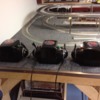I found this site a couple of weeks ago. I was mostly looking for information on late 70's, early 80's Williams trains. After reading the posts for a while another question has occurred to me.
Am I the only guy who would be happy running my trains around the track without the headaches of all these electronic miracles?
I got my first train in 1952 at Joske's in San Antonio. I carried it home in my lap sitting in the back seat of my grandmother's 1935 Ford. I loved that 671RR and all the others that followed. Like most of us I put them away until 1970 when I was introduced to the TCA. It started all over again. My layout achieved the size that small boys dream about. No multiple trains on one track, no station sounds, no remote uncoupling and fairly lousy smoke but endless hours of running my trains without having to worry that they might roll over and die if I said the wrong thing or pushed the wrong button.
Like I said, am I the only guy?







